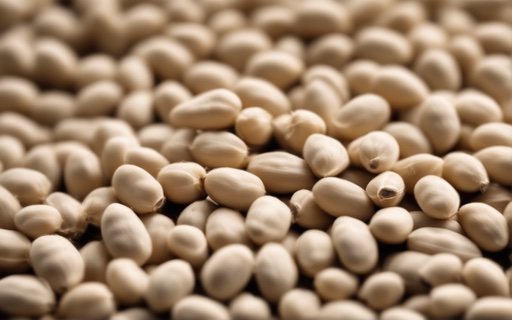Internet Asks: "Seed Soybean"
Soybean seeds, tiny yet potent powerhouses of nutrition and utility, serve as the foundation for a multitude of products and health benefits. Often overshadowed by their processed derivatives, these seeds deserve recognition in their own right for their nutritional content and versatility in various applications.
sponsored links

Historical Background
Soybean, scientifically known as Glycine max, belongs to the Fabaceae family. It is a leguminous plant native to East Asia. Soybeans have been cultivated for thousands of years. Ancient Chinese civilizations recognized the soybean as one of the essential "five sacred grains," and it was deeply integrated into their culture and cuisine. Over time, the cultivation of soybeans spread to other parts of Asia, including Japan and Korea, and eventually to the rest of the world.
Varieties
There are various types of seed soybeans:
-
- Roundup Ready Soybeans: Genetically modified to resist the herbicide glyphosate, these soybeans allow farmers to control weeds without harming the crops.
-
- LibertyLink Soybeans: These are resistant to glufosinate, another herbicide.
-
- Conventional Soybeans: Non-GMO varieties that are often used for specialty markets or organic production.
sponsored links
Nutritional Profile
Soybean seeds are a nutritional goldmine, offering an impressive array of nutrients essential for human health:
-
- Proteins: With a protein content hovering around 36-56%, soybeans serve as an excellent source of plant-based protein, making them particularly valuable for vegetarians and vegans.
-
- Essential Amino Acids: Soybeans contain all nine essential amino acids, which are crucial for the body’s protein synthesis and muscle growth.
-
- Healthy Fats: Although soybeans are high in fat (about 18-22%), a majority of these are healthy unsaturated fats. They also contain omega-3 fatty acids which are known for their heart-protective properties.
-
- Dietary Fiber: Contributing to digestive health, the dietary fiber in soybeans aids in regulating bowel movements and reducing cholesterol levels.
-
- Vitamins & Minerals: Soybeans are rich in various vitamins and minerals including B-vitamins, Vitamin E, iron, calcium, magnesium, and zinc.
-
- Isoflavones: These compounds, unique to soy, have been linked to various health benefits, including a lowered risk of heart disease and certain cancers.
Agricultural Importance
Soybean seeds are significant in agriculture. They are cultivated worldwide due to their adaptability to different climates and soil types. Their capacity to fix nitrogen improves soil fertility, making them an essential crop in sustainable farming practices.
sponsored links
Industrial Uses
Beyond their nutritional value, soybean seeds are utilized in various industries:
- - Oil Production: Soybean oil is a widely used cooking oil, also incorporated into products like margarine, salad dressings, and mayonnaise.
- - Animal Feed: After oil extraction, the remaining soy meal serves as a high-protein feed for livestock.
- - Biodiesel: With rising interest in alternative energy sources, soybeans have been tapped for biodiesel production due to their high oil content.
Culinary Applications
- - Soy Milk & Tofu: Soybeans are the primary ingredient in making soy milk and tofu, staples in Asian cuisine and popular among vegetarians globally.
- - Soy Sauce: Fermented soybeans are crucial in producing soy sauce, a universal condiment.
- - Edamame: Young, green soybeans, often referred to as edamame, make a tasty snack or side dish, celebrated for their rich, nutty flavor.
- - Tempeh and Natto: These fermented soy products are esteemed for their unique flavors and textures.
Environmental and Health Considerations
While soybeans offer numerous benefits, their large-scale cultivation has raised environmental concerns, especially when linked to deforestation in certain regions. Additionally, the extensive use of genetically modified (GM) soybeans has sparked debate about GM crop safety, sustainability, and biodiversity impacts.
While soybeans offer numerous health benefits, individuals with soy allergies or sensitivities should avoid them. Furthermore, some express concerns about excessive soy consumption, especially in processed forms, and potential impacts on hormone balance due to its phytoestrogen content.
Conclusion
Soybean seeds are small but mighty contributors to human nutrition and global cuisine. With their robust nutritional profile and versatile applications, they have rightfully earned their spot as a staple in various diets around the world. However, consumers should be aware of their origin, the potential for allergies, and make choices aligned with their health needs and ethical considerations.
Disclaimer: The information provided in this article is for general informational purposes only and is not intended as medical or professional advice. Always consult with a healthcare or industry professional before making any decisions based on this content. For the most accurate and up-to-date health information, please consult authoritative sources and qualified health professionals.
sponsored links
References
1. Harvard T.H. Chan School of Public Health. Straight Talk About Soy. https://www.hsph.harvard.edu/nutritionsource/soy/
2. Medical News Today. What are phytoestrogens? Benefits and foods. https://www.medicalnewstoday.com/articles/320630
3. Messina MJ. Legumes and soybeans: overview of their nutritional profiles and health effects. Am J Clin Nutr. 1999 Sep;70(3 Suppl):439S-450S. doi: 10.1093/ajcn/70.3.439s. PMID: 10479216.
4. NORTH CAROLINA SOYBEAN PRODUCERS ASSOCIATION. Uses of Soybeans. https://ncsoy.org/media-resources/uses-of-soybeans/#:~:text=Animal%20Feed%20Production,feed%20are%20fed%20to%20poultry.
5. Britannica. Soybean. https://www.britannica.com/plant/soybean
6. Michelfelder AJ. Soy: a complete source of protein. Am Fam Physician. 2009 Jan 1;79(1):43-7. PMID: 19145965.
7. U.S. DEPARTMENT OF AGRICULTURE. U.S. Soybean Production Expands Since 2002 as Farmers Adopt New Practices, Technologies. https://www.ers.usda.gov/amber-waves/2023/july/u-s-soybean-production-expands-since-2002-as-farmers-adopt-new-practices-technologies/
8. da Silva, R.F.B., Viña, A., Moran, E.F. et al. Socioeconomic and environmental effects of soybean production in metacoupled systems. Sci Rep 11, 18662 (2021). https://doi.org/10.1038/s41598-021-98256-6
9. Hong Guan Huat Kee. The Soybean Story. http://hghk.com.sg/soybean-story.html
People are also reading...
Is Tofu a Vegetable?
Soybean Miso
Tofu and Diabetes
Are Carrots Acidic?
Is Truvia the Same as Stevia?
Whole30 What to Expect?
Does Hot Chocolate Have Caffeine?
Are Carrots Acidic?
Are Mangoes Acidic?
Orange Juice pH?
Does Kahlua Have Caffeine?
Calories In a Grilled Cheese?
Ready to level-up?
Create meal plans 10x faster, follow up with your clients through our mobile app, and never struggle with meal planning or recipe management again.